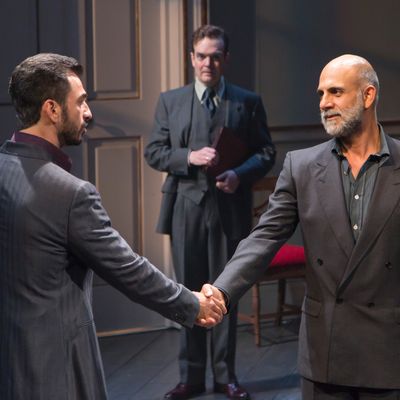
Diplomacy is a lovely word, suggesting the idea that with tact and perseverance humans can accommodate one another. Yeah, sure. If that seems unlikely, so does the idea that diplomacy could be the subject of a madly engrossing play, and for a similar reason: How do you make tact and accommodation rewarding? More specifically, how do you theatricalize draft treaties and position papers? Yet J.T. Rogers’s Oslo, which opened on Broadway tonight in a Lincoln Center Theater production directed by Bartlett Sher, turns the negotiations that led to the Israeli-Palestinian peace accord of 1993 into gripping human drama. To the extent that it does so by making diplomacy not just interesting but moving, it’s a wonder of savvy stagecraft and wily performance. It’s also, quite possibly, a lie.
I’m not referring to the fudging a play like this must engage in, even one whose first line is: “It’s all true. I’m not making this up.” Rogers has done prodigious enough research to make the necessary character compressions and invented dialogue basically believable, if a little rich. And certainly the story, however unlikely it sounds, really happened: A Norwegian couple — Terje Rød-Larsen and his wife, Mona Juul — did dream up and nurse to success a secret back channel between the bitterest of enemies even as the official talks in Washington and elsewhere got nowhere. Over the course of nine months, in a manor house near the title city, they forced reluctant representatives of Israel and the Palestinian Liberation Organization to produce the specific blueprints on which a peace might be built. The concept for these negotiations was a theory of diplomacy completely at odds with the formality and gradualism of the standard methods. Rød-Larsen, a sociologist way out on a limb, believed that only by forcing the parties to engage as individuals, over heated discussions but also over delicious waffles and many cases of Johnnie Walker Black, could enemies forge the human connections that made compromise both possible and desirable. “Only you together can do this,” he tells them. And, sure enough, the breakthroughs in Oslo come not so much from rethinking Gaza and Jerusalem as from the development of personal bonds, as when the main Israeli and Palestinian negotiators discover that each has a daughter named Maya.
When the production opened Off Broadway last July at the Mitzi Newhouse, I found Sher’s staging “remarkably swift and entertaining.” That was a mixed blessing, though; at a little over three hours, it seemed too short for its vast subject. Upstairs at the Vivian Beaumont, with a bit of tightening and just one intermission instead of two, it is even swifter, and more vivid. The bigger venue — the Beaumont seats 1,047 for Oslo, the Newhouse sat just 289 — has the paradoxical effect of making the already very large performances seem finer-grained as they’ve grown; the big personalities now fit the space. Among a large cast in which nearly everyone is a knockout, it’s hard not to focus on Michael Aronov as the Israeli Uri Savir, whose hilarious swagger takes the second half of Oslo to a fascinatingly weird place. (He wears a sharkskin suit and a form-fitting plum-colored shirt by Catherine Zuber and has the body confidence of a deodorant model.) Counterbalancing Savir, no doubt in life as in the play, are Jefferson Mays as Rød-Larsen and Jennifer Ehle as Juul; all hushed deference covering nerves of steel, they excel in the extremely unusual roles of protagonists rarely seen to do much. They would also make delightful plush toys if LCT needs to upmarket its merchandising.
It’s true that the two of them, Ehle especially, are still saddled with a lot of exposition as the play leaps from scene to scene. (“And then, the night before, disaster.”) Mays’s final speech, in which he asks us not to judge the value of diplomacy by where things are now but by how far they came from where they’d started, is also a misstep on Rogers’s part. The plea all but invites the audience to start pulling apart the play’s thesis, which follows Rød-Larsen’s: that human connection makes for more meaningful agreements. Certainly the history of Israel and Palestine post-1993 does not offer obvious proof of that, as Rogers well understands; he uses that dramatic irony — in which we know what the characters cannot about the future — to deepen the play’s undeniable emotional punch. Conversely, not everything forged by friendship is a success; maybe Molotov and Ribbentrop got along like gangbusters. And perhaps Trump and Putin do, too, or did.
It’s natural that Rogers, for whom Rød-Larsen and Juul were Oslo’s primary sources, would be invested in their point of view, but sometimes he seems less invested than imprisoned; perhaps the play should be called Stockholm. After all, the same history could lead to an opposite conclusion, that the formalism and gradualism of fuddy-duddy conventional diplomacy, making no attempt to forge personal bonds among negotiators, is truer to human nature and thus produces longer-lasting results (if less engaging plays). As Mao, in a witty anecdote related here, says when asked about the lessons of the French Revolution: “Too soon to tell.” Likewise, the history books will have to decide whether Oslo is great drama or just — just! — a great evening of theater.
Oslo is at the Vivian Beaumont Theater through June 18.

